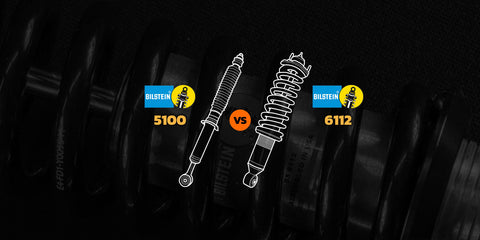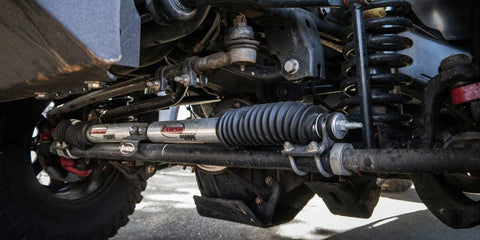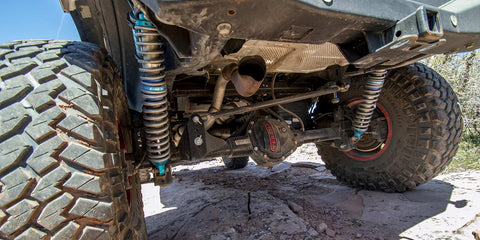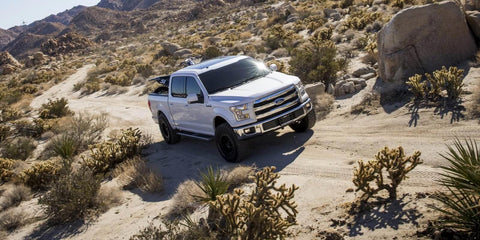Fox 2.0 Ride Review - Chevy Silverado 1500 Z71
Posted by Sean Reyes on
Baseline Vehicle Behavior
If this is the first piece you’re seeing of our 2021 Silverado 1500 Z71, we have also ridden on the Rancho RS9000XL Quicklift and adjustable shocks, Bilstein 5100 ride height adjustable shocks - all seeing significant changes from shock to shock.
Prior to this Fox 2.0 snap ring shocks kit, we were on the Bilstein 5100 shocks, which have digressive valving compared to Fox’s linear/progressive tune. We've compared Fox 2.0 versus Bilstein 5100 before, but this post will serve as an additional comparison piece.
First Impressions
Right out the gate we could tell the Fox 2.0 was softer than the Bilstein, but this has also been the case for the past few vehicles we’ve done this same comparison for. Surprisingly enough, the words ‘feel like the Ranchos’ came out of our mouths - but that’s not necessarily a bad thing.
Comfort Trade-offs
The stock Ranchos, along with the RS9000XL shocks that were on this vehicle, were plenty soft, but to a fault. Their lack of rebound valving left the vehicle feeling too loose and floppy up bumps and driveways, or carrying any significant load. The Fox 2.0 tuning makes up for that through better rebound performance - meaning as the vehicle is coming out of a compression action (hitting the driveway), the shocks slow the suspension down back to the middle of suspension travel. Both Rancho options, with their 29mm and 31mm pistons can't rebound-dampen any significant weight well.
Fox vs Bilstein
The easiest way to explain the differences between the Fox 2.0 and the Bilstein 5100/4600 is bump compliance - how the suspension handles potholes, speedbumps, and rocky trails.
- Bilstein is a digressive shock, firm up front and at the beginning ranges of motion, then it smoothes out the more suspension travel that gets used at faster speeds.
- Fox is a linear shock, with a progressive touch, softer up front and at the beginning ranges of motion, and also smoothes out during faster speeds and more suspension articulation.
There are also some material differences between these shocks; Fox 2.0 is an aluminum body compared to Bilstein’s steel body, bushing material is different, shaft hardness, and Fox allows serviceability (you can rebuild them). But most of that doesn’t matter for people that just want a specific ride.
Expectations of Comfort
This will come down to what creates ‘comfort’ for the driver - not everyone wants a cadillac plush ride. Some drivers get comfort out of being in control and having confidence in handling. Others want a soft plush ride, and dont mind if its too squishy to deliver a sportier drive.
Fox is softer overall; softer on bumps and choppy trails, while still providing improved handling over stock.
Bilstein is firmer overall; providing drastic improvements in handling, but being harsher on small bumps and choppy trails.
Off-Road Impressions
The biggest difference on off-road trails, mountainous terrain, and easy forest service roads, is that the Fox 2.0 will ‘eat-up’ more of the choppy stuff. Will feel softer, similar to what it feels like when you lower your tire’s PSI by 20-30 - everything a bit more subdued.
Will the Fox 2.0 aluminum body make a difference for people? Aluminum is lighter and heat travels through it faster than steel, which means heat from the oil inside is going to transfer to the body of the Fox shock. Some of you hard-charging drivers will see benefit of running the Fox compared to Bilstein, as we have experienced fade in the Bilstein 5100 on our other test vehicles.
With that said, though, this truck doesn’t get too aggressive in the dirt for extended lengths of time, so we didn’t experience fade in either the Bilstein 5100 or these Fox 2.0.
Enthusiast & Experts’ Takeaway
The Fox 2.0 for the Silverado is definitely the most balanced shock that this truck has seen, not too firm, not too soft.
Jeff the owner of the Silverado does miss the Bilstein shocks when towing, but for daily driven comfort - the Fox 2.0 Performance Series is the choice thus far.












